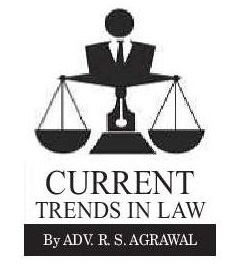ONEROUS DEMAND FOR BAIL
26 Aug 2024 11:45:40

By ADV. R. S. AGRAWAL :

The question for
consideration, which arose
before the Court was as to
whether the petitioner was
entitled to the
relief of treating the personal
bond and one set of sureties
already furnished as holding
good for the other bail orders
also?
I
N THE Judgment of the case- Girish
Gandhi v.The State of Uttar Pradesh
and Others, delivered on August
22, 2024, Justice Bhushan R. Gavai
and Justice K.V.Viswanathan, at
the Supreme Court, have dealt with
problems arising from onerous conditions being imposed by trial courts and
High Courts while granting bail, and
quite tersely stated that bail attached
with onerous conditions is no bail.
This writ petition was filed under
Article 32 of the Constitution of India
seeking an appropriate writ/direction
to the effect that the personal bonds and
sureties executed by the petitioner in
connection with FIR of January 21, 2021
registered at the Police Station Sadar,
District Gurugram, shall hold good for
11 other bail orders passed in his favour
from the Courts of different States.
The question for consideration, which
arose before the Court was as to whether
the petitioner was entitled to the
relief of treating the personal bond and
one set of sureties already furnished as
holding good for the other bail
orders also?
Very broadly, the prosecution case is
that the company with which the petitioner was concerned, namely, White
Blue Retail Pvt. Ltd. allowed the use of
its trade name through franchisee agreement for opening of Grocery Shops. The
Company also took the franchisee
amounts and refundable security. The
gist of the allegation is that the Company,
which was to give space to open store
on rent in some cases and made other
promises, failed to deliver those.
Totally, 13 FIRs came to be registered
against the petitioner under various sections-406, 420 and 506 of IPC. The petitioner had submitted that he had already
furnished personal bail bonds with one
surety of Rs 50,000/- in the Trial Court
in respect of FIR No.00302021 of 2021
registered at the Police Station Sadar,
Gurugram. The petitioner also submitted that he had fulfilled conditions of
bail with respect to the order passed by
the Addl. Chief Judicial Magistrate,
Thalassery, Kerala in FIR No. 53/2020
registered at the Police Station, Pinarayi,
Kerala.
The petitioner’s contention has been
that that he was the main bread earner of the family.
He has claimed that he
was merely working in the Company as
In-charge (Accounts), though this was
disputed by the prosecution. The claim
of some of the complainants in some
of the FIRs is that he was the Director
of the Company. The Court was not
interested in resolving that issue in this
case. The petitioner had further contended that his wife was physically handicapped and was a teacher in a private
school and barely earns enough to eke
out a living for herself and their son.
Petitioner has also stated on oath that
he has an aged mother to take care of.
The main plea of the petitioner was
that he was not in a position to furnish
separate sureties, as directed in the
remaining 11 bail orders.
In view of that he sought for treating
the sureties already furnished in two cases in such a manner as to enure to the
benefit of all the other 11 cases.
On April 8, 2024, the Supreme Court
passed the order, issuing notice, in
response to the petitioner’s prayer for
other 11 bail orders.
A perusal of the
chart revealed that while in the State of
Uttar Pradesh there are 6 FIRs with other two in Haryana, one in Punjab, two
in Rajasthan and one in Uttarakhand
and also one FIR in Kerala.
According to the SC, it is undisputed
that that in the 13 matters the petitioners stand enlarged on bail. The bail
orders have become final and have not
been challenged by the prosecution. In
two of cases at Sadar in Gurugram in
Haryana and Pinrayi in Kerala, sureties
already stand furnished. Inspite of
obtaining bail in 13 cases, the situation
today is that the petitioner was unable
to furnish sureties.
As has been mentioned earlier, the
cases against the petitioner are in six
States. Insofar as the case in Kerala is
concerned, he has already furnished
sureties and there is only case in that
State. In Haryana, in one case he hasfurnished sureties and in the case hehas been ordered is Fixed DepositReceipt for a sum of Rs one lakh. TheSupreme Court is not inclined to interfere with this order. In remaining States– U.P., Rajasthan, Punjab andUttarakhand, even though in the casesbail has been ordered, the petitioner isstill in custody because he is unable tofurnish sureties.
The Oxford Dictionary defines ‘surety’ as “a person who takes responsibility for another‘s obligation. AdvancedLaw Lexicon by P. Ramnatha Aiyar, 3rdEdition 2005 defines ‘surety’ to mean“the bail that undertakes for another manin a criminal case”. After recalling the memorable wordsof Justice V.R. Krishna Iyer in the judgment of the case – Motiram and Othersv. State of Madhya Pradesh –(1978)4SCC 47 para 33, the SC proposed torelieve the petitioner from the directionto produce a local surety.
Keeping the principles discussed inmind, the SC directed that for the FIRspending in each of the States of UttarPradesh, Rajasthan, Punjab andUttarakhand, in each State, the petitioner will furnish his personal bond forRs 50,000/- and furnish two suretieswho shall execute the bond for Rs30,000/- each, which shall hold good forall FIRs in the concerned State, for thecases mentioned in the chart. The sameset of sureties is permitted to stand assurety in all the States.
According to the Court this directionwill meet the ends of justice and will beproportionate and reasonable.
The Supreme Court has stated thatthis condition will supersede the condition imposed in the respective bail
orders. The petitioner may pursue independent proceedings with regard to fourcases, specifically mentioned by theSupreme Court in this judgment withFIR numbers related to those cases. TheSupreme Court has allowed the writ
petition in terms of its directions.